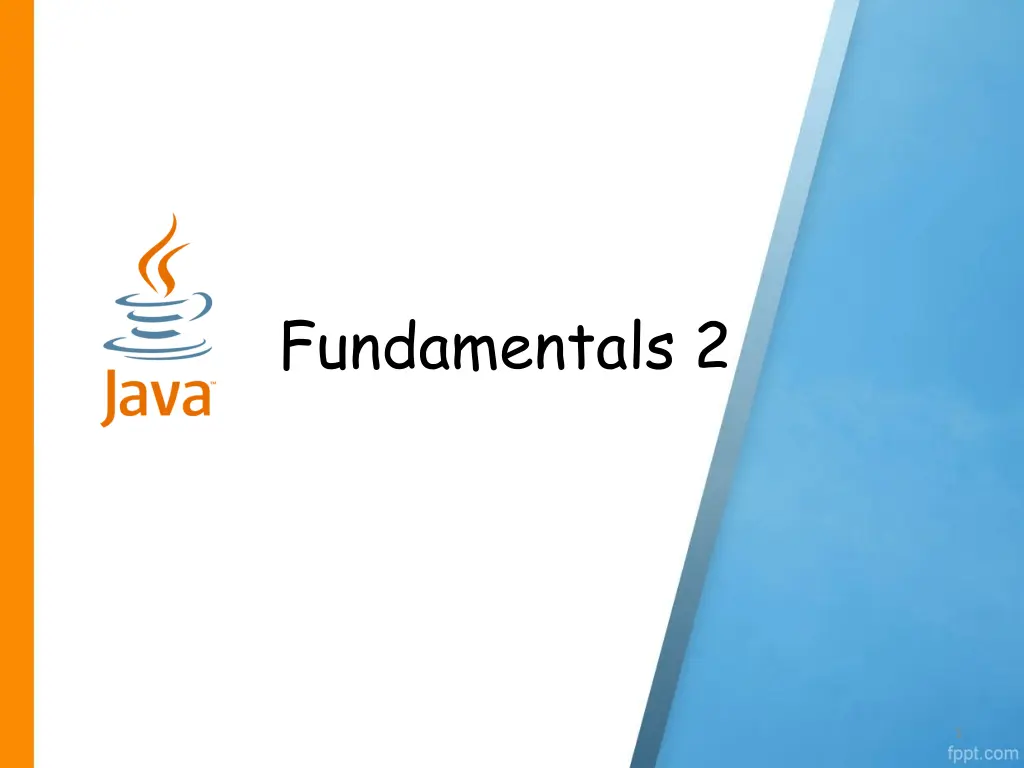
Java Programming Fundamentals and Data Types
Learn about identifiers, state, data types, and primitive data types in Java programming. Understand the rules for naming identifiers, declaring variables and constants, and the characteristics of different data types such as boolean, char, int, long, float, and double.
Download Presentation

Please find below an Image/Link to download the presentation.
The content on the website is provided AS IS for your information and personal use only. It may not be sold, licensed, or shared on other websites without obtaining consent from the author. If you encounter any issues during the download, it is possible that the publisher has removed the file from their server.
You are allowed to download the files provided on this website for personal or commercial use, subject to the condition that they are used lawfully. All files are the property of their respective owners.
The content on the website is provided AS IS for your information and personal use only. It may not be sold, licensed, or shared on other websites without obtaining consent from the author.
E N D
Presentation Transcript
Programs and Data Most programs require the temporary storage of data. The data to be processed is stored in a temporary storage in the computer's memory: space memory. A space memory has three characteristics Identifier Data Type State 2
Identifier is a sequence of characters that denotes the name of the space memory to be used. This name is unique within a program. Identifier Rules It cannot begin with a digit (0 9). It may contain the letters a to z, A to Z, the digits 0 to 9, and the underscore symbol, _. No spaces or punctuation, except the underscore symbol, _, are allowed. Identifiers in Java are case-sensitive. Thus, the identifiers myNumber and mynumber, are seen as two different identifiers by the compiler. 3
State My be changed variable All lowercase. Capitalizing the first letter of each word in a multiword identifier, except for the first word. Cannot be changed constant All uppercase, separating words within a multiword identifier with the underscore symbol, _. 4
Data Type The data type defines what kinds of values a space memory is allowed to store. All values stored in the same space memory should be of the same data type. All constants and variables used in a Java program must be defined prior to their use in the program. 5
Java built-in Data Types Constant or Variable First Decision Level Second Decision Level Numeric Character Boolean Third Decision Level Integer Floating-point char String boolean byte float Fourth Decision Level short double int long 6
Primitive Data Types Size (bits) Type Range Description boolean true, false Stores a value that is either true or false. Stores a single 16-bit Unicode character. Stores an integer. char 16 0 to 65535 byte 8 -128 to +127 short 16 -32768 to +32767 Stores an integer. int 32 bits -2,147,483,648 to +2,147,483,647 -9,223,372,036,854,775,808 to +9,223,372,036,854,775,807 Stores an integer. long 64 bits Stores an integer. float 32 bits accurate to 8 significant digits Stores a single-precision floating point number. double 64 bits accurate to 16 significant digits Stores a double-precision floating point number. 7
Variable/Constant Declaration When the declaration is made, memory space is allocated to store the values of the declared variable or constant. The declaration of a variable means allocating a space memory which state (value) may change. The declaration of a constant means allocating a space memory which state (value) cannot change. 8
Constant Declaration final dataType constIdentifier = literal | expression; final double PI = 3.14159; final int MONTH_IN_YEAR = 12; final short FARADAY_CONSTANT = 23060; These are called literals. final int MAX = 1024; final int MIN = 128; final int AVG = (MAX + MIN) / 2; This is called expression. 9
Variable Declaration A variable may be declared: With initial value. Without initial value. Variable declaration with initial value; dataType variableIdentifier = literal | expression; double avg = 0.0; int i = 1; int x =5, y = 7, z = (x+y)*3; dataType variableIdentifier; double avg; int i; Variable declaration without initial value; 10
More declaration examples String declaration with initial value: String word="Apple"; without initial value: String word; char declaration with initial value: char symbol ='*'; without initial value: char symbol; Boolean declaration: with initial value: boolean flag=false; boolean valid=true; without initial value: boolean flag; 11
Exercises A-Declare a variable of double type with initial value=0.0; B- Declare a constant of String type with initial value= Good C- Declare a variable of type string with initial value equals to the value of constant in B. D-Is the following names are valid , why? Student name 1course course*name 12
